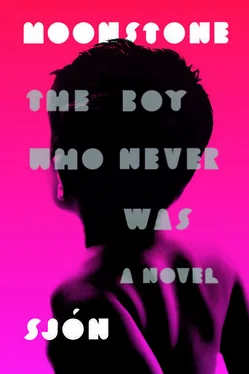He is grateful for the old lady’s noisy delight in reading; were it not for her, he wouldn’t know the first thing about home or world affairs, since he himself is so illiterate — the letters of the alphabet disguise themselves before his eyes, glide between lines, switch roles in the middle of a word, and might as well be a red code to which he does not have the key — that he can barely struggle through the programs and title cards at the cinema.
Although, as a rule, little in the papers captures his interest — anything that happens in Iceland seems too small, while overseas events affect him only if they are grand enough to be made into films — the news in the last few days about the Spanish flu has held a lurid fascination for the boy:
He has a butterfly in his stomach, similar to those he experiences when he picks up a gentleman, only this time it is larger, its wingspan greater, its color as black as the velvet ribbons on a hearse.
An uncontrollable force has been unleashed in the country; something historic is taking place in Reykjavík at the same time as it is happening in the outside world.
The silver screen has torn and a draft is blowing between the worlds.
* * *
“But where is Sóla G—?”
The boy has not seen her for nineteen days, not since that night on Öskjuhlíd.
The fires of Katla are dying down, but the plume of ash can still be glimpsed on the horizon when the cloud cover permits. This morning the citizens of Reykjavík awoke to find a layer of ash covering their windowpanes. At ten o’clock it was still so dark in the bedrooms of the town that one would have thought it was the middle of the night. Many have risen late as a result, and people are still coming to terms with reality when the boy gets up at midday.
He performs his habitual circuit of the town, checking which films are to be shown that evening— The Spoilers at the New Cinema, Hearts in Exile at the Old — then buys himself some curds at the Fjallkonan restaurant and peruses the picture papers at S. Jón’s Bookshop. But today this is merely a pretext.
The boy invariably arranges his route so it passes the house belonging to the parents of Sóla G—. There is no movement inside. He is relieved. She cannot be lying ill indoors.
It begins to rain. The ash runs in gray streams down the walls, cascading into the street. It is sticky underfoot.
* * *
— Were you giving me the eye at the bathhouse yesterday?
— So what if I was?
— I thought maybe you wanted me to drop by.
— Maybe I did.
— Well, here I am.
The boy is standing in the yard behind the Á.C. photographic studio. The rain rattles on the corrugated-iron porch over the back entrance. The photographer leans against the doorpost, studying the boy, then says curtly:
— Come in.
Unusually, the photographer does not attempt to kiss him but only wants them to jerk each other off. They are quick to come. The photographer hands the boy three krónur:
— I’m afraid you won’t be as busy for a while, pal.
The boy shrugs and heads back out into the rain.
The photographer was one of his first gentlemen. It was from him that he acquired the photograph of Muggur. The picture shows the artist in a black suit, with bangs down to his eyes and a roguish smile on his lips. There is a cigarette in his hand, which he must have lowered the instant the shutter opened.
The movement of his arm is sketched in the air as if Muggur had made a brushstroke in time.
* * *
The boy’s next stop is the yard of the Reykjavík Automobile Association, where Sóla G— is permitted to tinker with her motorcycle in return for helping to clean the taxicabs. He hovers at a discreet distance from the workshop, watching the vehicles come and go. The drivers are used to lads hanging around and pay no attention to the boy, apart from one who winks at him. The boy ignores this but makes a mental note of the man’s face together with the noise of his engine.
The girl is not there and does not show her face during the hour or more that the boy waits.
* * *
Darkness begins to fall once more. The town ambulance speeds in the direction of Sudurgata. Beside the driver, a young woman in a wide-brimmed hat sits staring palely ahead.
The boy sets off home. He must eat his dinner so he can carry on his search for the girl.
He whistles a tune as he walks and smiles when he realizes where he heard it. The sound had wafted down from the upper floor into the storeroom of the photographic studio.
The names Peter and Pan float along with the melody.
Before Máni Steinn discovered Sóla G—, he had thought Muggur the fairest of them all.
When the boy next sees Sóla G— she is among a gaggle of girls outside a house in Vonarstræti where dressmaking is taught and, it is rumored, women’s rights are discussed.
In this company she is dressed, like any other Reykjavík society girl, according to the latest fashion, in an English lady’s trench coat, a knitted hat in green and brown, and buttoned leather boots that disappear under the hem of her calf-length skirt. Compared with her motorcycle outfit, the boy has to admit this getup is disappointingly conventional.
But it’s all right. He knows that it’s in the nature of women like Sóla G— and Irma Vep, her French doppelgänger played by Musidora in The Vampires , to don a thousand disguises and be simultaneously “Everywoman” and “The One Woman”—even when dressed in suit and tie.
* * *
The Vampires ( Les Vampires ) is a seven-hour-long French film by Louis Feuillade. Over ten episodes it tells the story of the eponymous gang of nihilists who hold French society in the grip of fear. Under the leadership of their brilliant and ruthless master, the Grand Vampire, they have penetrated the highest echelons of society, corrupting everyone they can, intimidating and murdering all those they cannot.
Paris is in disarray, unpredictable and lethal. People are murdered in cafés and railway carriages, in the streets, in back rooms, and in their own bedrooms. Every other person is in disguise, name and social rank are no guarantee — the haute bourgeoisie cannot distinguish their own from members of the criminal gang — every pocket conceals a weapon, every closet a corpse; new mechanical inventions are used to commit elaborate crimes. In a city where reason is daily executed with its own weapons, nowhere is safe.
Foremost among the Vampires is the girl Irma Vep. Wearing a black costume that clings to the curves of her shapely figure, she scales buildings like a shadow and breaks into apartments and government offices before making her escape over the rooftops.
And all is achieved with the cheerful zeal of one who has turned her back on the laws of her fellow men.
O Irma Vep, queen of the cloud-veiled night!
* * *
The dressmaking group prepares to head home, with all the hugging and kissing that invariably attend womankind. The girls who live in the “gods,” the neighborhood of streets named for the old Norse pantheon, are to walk together south around the lake and up the hill; two of the others are going to cycle along the shore to the west end of town; while the rest plan to stroll arm in arm down to Lækjartorg Square to promenade a little before heading up Hverfisgata and home. But these plans are cut short when the sewing mistress appears on the steps and calls them over.
The girls turn cheerful faces toward her, but the woman’s grave expression soon spreads to their own. They hurry over and she beckons them back inside.
Sóla G— is last to mount the steps. It seems to the boy that just as the door is closing behind her, her glance falls on his hiding place.
Читать дальше












